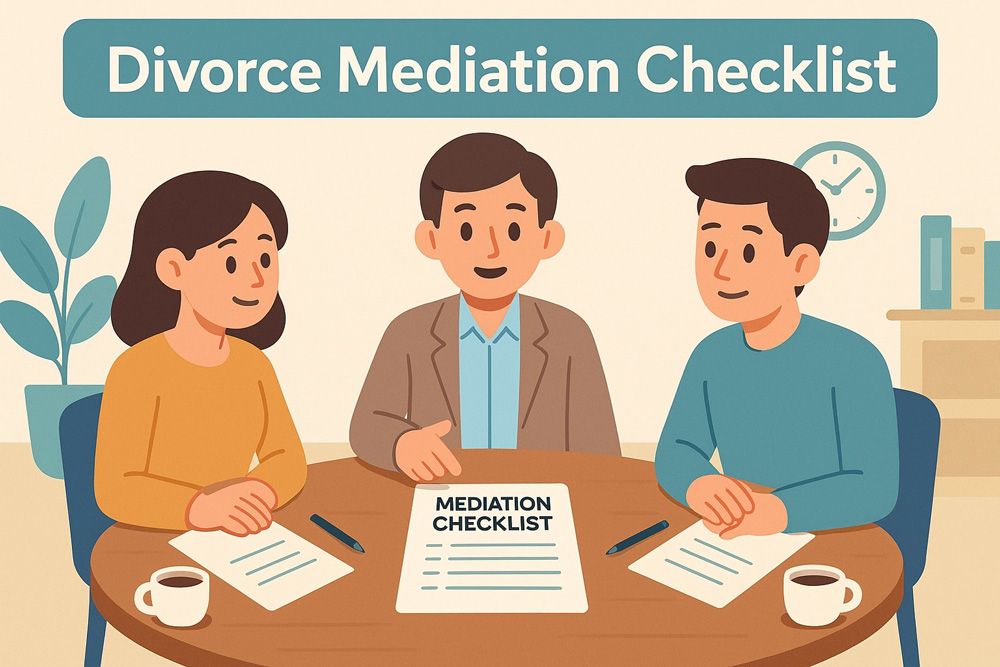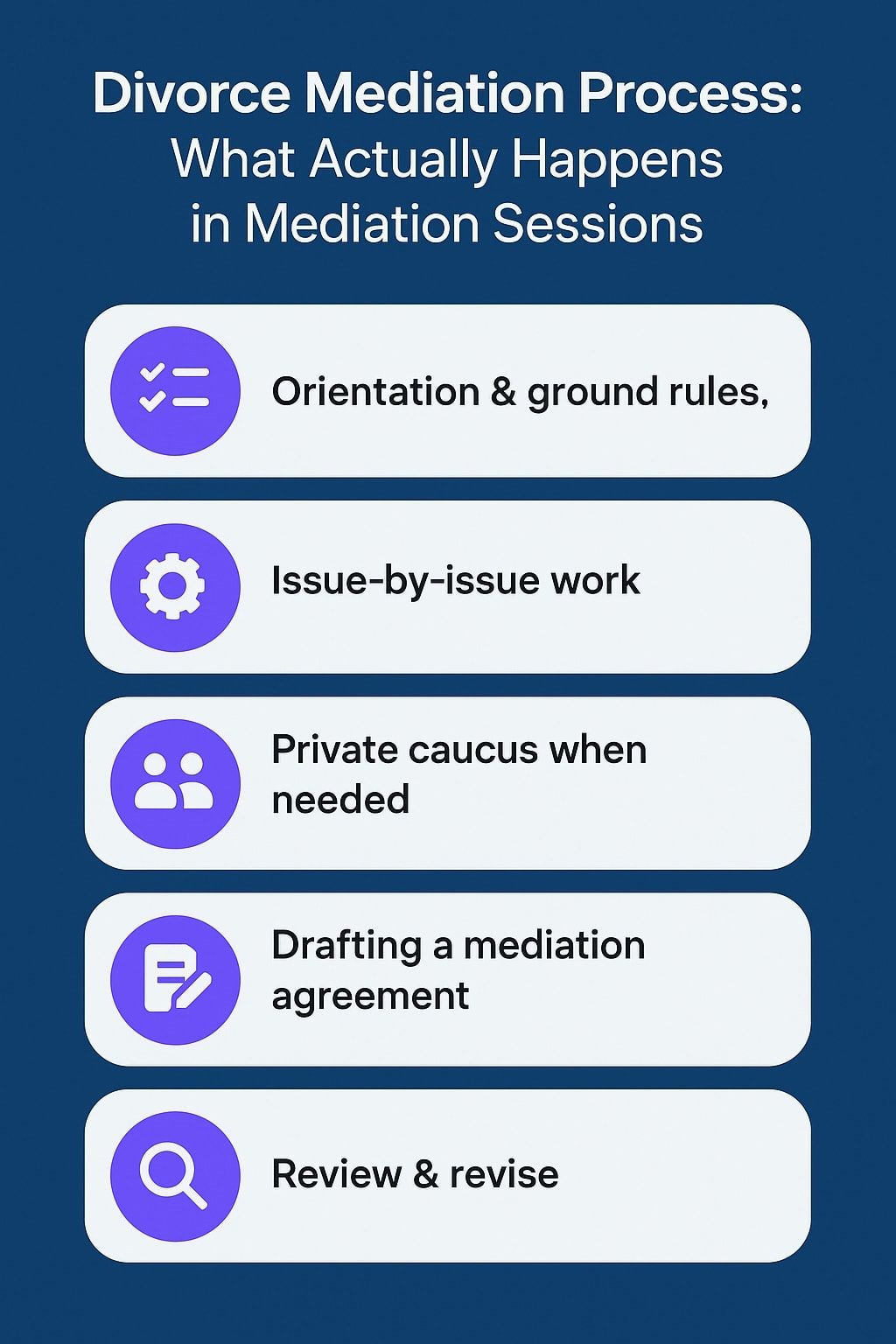Your Complete Divorce Mediation Checklist: How to Prepare for a Smoother Resolution
Sheldon Forehand • October 17, 2025

If you’re considering divorce mediation, you’re carrying a lot, facts, feelings, and maybe a few fears. I’ve worked with high-risk youth, parolees rebuilding trust, and corporate teams untangling stalemates. The lesson that shows up in every room: when people feel calm, seen, and informed, they make better decisions. That’s the heart of the ultimate divorce mediation checklist below, clear steps that dial down the heat and turn a hard season into a workable plan.
Download Your Free Divorce Mediation Checklist (PDF)
Want to stay organized?
Click below to download a printable version of this checklist — your step-by-step guide to prepare confidently for mediation.
Idaho note: Mediation here is voluntary, guided by a neutral third party (the mediator), and protected by Idaho court rules on confidentiality. See Idaho Rule of Family Law Procedure 603 and Idaho Rule of Evidence 507 for the framework around the mediation process and confidentiality.
Divorce Mediation Checklist: Your Idaho-Ready Prep (Documents, Decisions, and Expectations)
Before you attend mediation, gather all the documents you’ll need. Think of this mediation checklist like cleaning out the garage before a move: the more you sort first, the smoother the negotiation process goes.
Identity & case basics
- Government ID; any filed papers with a case number
- Prenuptial agreements or post nuptial agreements (if any)
- Contact info for your divorce attorney/divorce lawyer (if you have one)
Income & budgets
- Two months of pay stubs, recent tax return, bank statements, and financial statements
- A simple monthly budget (housing, transport, childcare, debt service)
- A list of bank accounts and recurring bills (auto-pay can hide surprises)
Assets, debts & property
- Deeds, mortgage/HELOC, titles, appraisals
- Account statements for investments and retirement (401(k), IRA)
- Loans and credit cards (balance + rate)
- Notes on marital assets, separate property, and property division goals (who keeps the house? buyout vs. sell?)
Kids & parenting
- School/childcare schedules, medical info
- Draft parenting plan ideas (custody schedule, holidays, travel, decision-making, visitation arrangements)
- Back-up caregiving options
Insurance & benefits
- Medical, dental, and life insurance policies; plan summaries; premiums
- Health insurance options after divorce (COBRA, marketplace; see resource links below)
Support & taxes
- Early proposals on spousal support and child support (we’ll refine together)
- Tax considerations for alimony payments (post-2018 rules change the math).
Retirement & QDRO
- If retirement is on the table, flag early: many plans require a qualified domestic relations order (QDRO) to divide benefits.
Pro tip: Successful divorce mediation depends on preparation and emotional pacing. Bring this divorce mediation checklist in a folder (or digital binder) and add a one-page “goals and boundaries” sheet for both financial issues and co-parenting.
Comprehensive Divorce Mediation Checklist (Idaho-Ready)
| Category | What to Bring / Do | Why It Matters |
|---|---|---|
| Identity & Case Basics |
|
Confirms your identity and ensures the mediator and court have accurate case details. |
| Income & Budgets |
|
Helps calculate fair spousal support and child support. Clarifies each spouse’s financial picture. |
| Assets, Debts & Property |
|
Ensures accuracy for property division and debt allocation; prevents disputes during the mediation process. |
| Kids & Parenting |
|
Forms the foundation of your child custody and parenting plan discussions. |
| Insurance & Benefits |
|
Clarifies who will maintain health insurance for children and spouses after the divorce process. |
| Support & Taxes |
|
Keeps negotiations aligned with tax law and child support guidelines; prevents surprises later. |
| Retirement & QDRO |
|
Divides retirement plans correctly; ensures no penalties or delays in processing. |
| Mindset & Emotional Prep (1–2 Weeks Before) |
|
Emotional readiness makes the negotiation process more productive and less stressful. |
| During Mediation Sessions |
|
Encourages productive dialogue, reduces emotional escalation, and helps reach a fair agreement. |
| After Mediation (1 Week–3 Months Post-Session) |
|
Transforms your mediated decisions into legally binding outcomes and ensures nothing falls through the cracks. |
| Optional Idaho Resources |
|
Trusted references for Idaho family law and mediation rules. |
Divorce Mediation Process: What Actually Happens in Mediation Sessions
Here’s how the divorce mediation process usually unfolds in Idaho:
- Orientation & ground rules. We confirm confidentiality and how we’ll communicate. Idaho’s rules describe mediation communications and privileges, helpful to reduce fear and encourage candor.
- Issue-by-issue work. In mediation sessions, we move through parenting, support, property, and logistics. I facilitate (I don’t provide legal advice) and reality-check proposals as a neutral third party.
- Private caucus when needed. If emotions spike, we take breaks or use shuttle caucusing. That space often leads to creative solutions and more mutually beneficial solutions.
- Drafting a mediation agreement. As consensus forms, I write a plain-English mediation agreement or term sheet.
- Review & revise. You may want independent legal advice from an independent attorney, especially on tax and property language. I can’t provide legal advice, and neither can most mediators, but experienced family law attorneys can review drafts quickly.
- Final agreement & filing. Once you’re comfortable, we convert the term sheet into a marital settlement agreement or divorce settlement agreement for court filing. (Counties may require mediation before further court proceedings, check local instructions.)
Idaho resources: Family Court Services provides information on child custody mediation, parenting plan assistance, and where to find forms.
Child Custody & Custody Arrangements: Building a Parenting Plan That Works
When children are involved, child custody and custody arrangements deserve extra care. In Idaho, the Idaho Child Support Guidelines (IRFLP 120) offer a uniform method for calculating child support and include worksheets to keep numbers transparent.
What we’ll cover in mediation:
- Legal custody and decision-making (education, medical, activities)
- Weekly custody schedule and exchanges (with detail for school breaks and holidays)
- Travel permissions, communication norms, and dispute-resolution steps
- How changes get handled (kids grow; plans should flex without chaos)
Idaho’s court site hosts forms, classes, rosters, and enforcement resources (e.g., parenting time enforcement under IRFLP 816). If you need to adjust later, the rules provide a path.
Spousal Support & Child Support: Plain-English Basics for Idaho Families
- Child support is calculated with the Idaho Guidelines (income, time-share, and other factors). The state publishes a schedule and standard worksheets. +1
- Spousal support (alimony) is separate from child support. Federally, alimony payments under agreements executed after 2018 are not deductible by the payer and not taxable to the recipient; this changes negotiation dynamics in mediation.
We’ll discuss support realistically, how much, how long, and how to revisit. If one or both spouses want deeper strategy, involving attorneys for a targeted review can help keep a fair agreement on track without inflating legal expenses.
Health Insurance, COBRA & Life Insurance Policies After the Divorce Process
Many families worry about health insurance during the divorce process. Under federal law, divorce is a qualifying event for COBRA, which can let a spouse or dependents continue coverage for a limited period (often 18–36 months, depending on the situation). Start by reading the Department of Labor’s overview and FAQs, then compare with marketplace plans.
In mediation we also talk about:
- Who will maintain medical/dental for the kids and how you’ll split uncovered costs
- Whether to keep or adjust life insurance policies to secure support obligations
- How to budget for premiums, deductibles, court costs, and filing fees
Retirement Plans & QDRO: Don’t Let the Details Derail a Final Agreement
If your retirement plans or pensions are part of the divorce settlement, you’ll likely need a qualified domestic relations order. A decree that simply says “split the 401(k)” usually isn’t enough. The DOL’s handbook (and Q&A chapters) explain what plans need and how settlement agreement language should sync with plan rules.
In practice: we decide who drafts the QDRO, who pays the drafting fee, when it’s submitted to the plan administrator, and what to do if it’s rejected. Building this into the mediation agreement prevents late-stage surprises.
Property Division, Debt Allocation, and Financial Matters: Build a Clear Map
Idaho follows its own divorce laws and rules for property division and debt allocation, and while mediation isn’t a courtroom, clarity still matters:
- Inventory marital assets and debts (home equity, vehicles, cards, student loans)
- Decide what happens to bank accounts and credit lines
- Spell out transfers, timelines, and who pays which financial matters (tax prep, appraisals)
- If you own a business or face complex disputes, consider a neutral valuation expert
Clear, written terms help resolve disputes later and reduce returns to court proceedings.
Marital Settlement Agreement vs. Divorce Settlement Agreement vs. Mediation Agreement (What’s the Difference?)
- A mediation agreement (or term sheet) is the draft you build in mediation sessions; it captures what you agreed in principle.
- A marital settlement agreement (MSA) or divorce settlement agreement is the polished version filed with the court, often attached to your decree.
- Once the court adopts it, you’ve got a binding final agreement you can rely on.
I’ll help you keep the language plain and specific; experienced family law attorneys can spot legal pitfalls I can’t, because I don’t provide legal advice.
Divorce Litigation vs. Collaborative Divorce vs. Divorce Arbitration: Choosing a Path
Most families use divorce mediation because it protects relationships and dollars. Some cases need other tracks:
- Collaborative divorce uses a team (lawyers, sometimes neutral financials and coaches) to reach a mutually agreeable solutions without court.
- Divorce arbitration puts a private decision-maker in the judge’s chair; faster than traditional litigation, but less flexible than mediation.
- Divorce litigation (i.e., traditional litigation) is sometimes necessary (urgent safety orders, intractable conflicts), but it’s usually the costliest path.
Even if you start in court, Idaho courts and local programs often encourage mediation along the way.
Divorce Attorney or Divorce Lawyer: When to Bring Counsel Into Mediation Services
I value lawyers who protect clients without inflaming conflict. You can hire a divorce attorney/divorce lawyer for:
- Divorce mediation preparation (strategy, documents)
- Limited-scope attendance at mediation sessions
- Independent legal advice on the draft settlement agreement
A good lawyer helps resolve disagreements, not escalate them, and keeps your agreements aligned with Idaho family law.
How We Aim for Successful Mediation (and an Amicable Post Divorce Relationship)
After hundreds of rooms with tough conversations, I’ve learned that successful mediation (and a more amicable post divorce relationship) is about three habits:
- Slow down to speed up. We separate emotion from logistics, then bring empathy back when it’s time to test creative solutions.
- Make it durable. The more precise your custody arrangements and money terms are, the less you’ll fight later.
- Focus on the kids. When you can co-author a parenting plan, you’re already finding mutually beneficial solutions that help everyone.
Idaho’s mediation community expects ethical, impartial practice. As a board member of the Idaho Mediation Association, I follow its Standards of Practice, impartiality, informed decision-making, and confidentiality.
Practical FAQs to Resolve Disputes Early
Is divorce mediation confidential in Idaho?
Generally yes; I.R.E. 507 defines mediation communications and privileges, and IRFLP 603 references confidentiality protections for mediations in family law matters. (Always review specifics with counsel.)
What about spousal support and taxes?
For agreements executed after 2018, federal rules treat alimony differently, no deduction for the payer, no income to the recipient. That affects negotiation in divorce mediation.
Can counties require us to try mediation before hearings?
Some local instructions indicate mediation may be expected before further court proceedings; check your county and Court Assistance Office guidance.
Where can we learn about Idaho child support?
Read the Idaho Child Support Guidelines and use the state worksheets to test proposals before you lock them in.
What if we can’t agree on parenting details?
Idaho rules provide tools, from Parenting Coordinator appointments to enforcement paths, so families can keep moving without relitigating every small thing.
Do I need a lawyer during divorce mediation in Idaho?
Not necessarily. Many people attend mediation without attorneys, but having one can be helpful, especially when reviewing your mediation or marital settlement agreement. If you bring a lawyer, they can attend sessions in a limited-scope role or advise you privately between meetings. I don’t provide legal advice, but I encourage clients to have agreements reviewed by a family law attorney before filing.
What if my spouse refuses mediation?
Mediation in Idaho is generally voluntary, but some counties may require couples to try mediation before certain hearings. If your spouse refuses, the court may still encourage or order participation later. Often, once the process is explained as confidential and non-adversarial, spouses become more open to it, especially when they see how it saves time, money, and stress compared to traditional litigation.
A Step-By-Step Mediation Checklist (Clip-and-Carry)
1) Mindset & plan
- Name needs vs. wants, and your “no-go” lines.
- Decide where you can compromise to resolve disputes.
2) Documents (bring paper + digital)
- ID, any filed pleadings, prenup/post nuptial agreements
- Two months of pay stubs; latest tax return; bank statements; list of bank accounts
- Deeds, titles, loans; retirement statements (flag QDRO needs)
- Insurance cards and plan summaries (medical, dental, life insurance policies)
- Draft parenting plan with custody schedule, exchanges, and holiday plan
3) Money & benefits
- Early numbers for spousal support and child support
- Health insurance plan after divorce (COBRA vs. marketplace)
- Who pays court costs, appraisal fees, QDRO drafting, and other legal expenses
4) Session game plan
- Decide whether you want your divorce attorney in the room or on call
- Use breaks and private caucus to keep progress (remember: mutually beneficial solutions last longer)
5) Lock it in
- Convert terms to a mediation agreement, then to a marital settlement agreement/divorce settlement agreement for filing
- Add QDRO steps and deadlines so the transfer actually happens
Quick Timeline Reference
| Phase | Approx. Timeframe | Checklist Focus |
|---|---|---|
| Emotional & mindset prep | 1–2 weeks before mediation | Ground yourself; clarify goals |
| Document collection | 2–3 weeks before mediation | Income, assets, debts, parenting info |
| Mediation sessions | 1–3 sessions | Work through issues & proposals |
| Agreement drafting | 1 week after mediation | Finalize mediation or marital settlement agreement |
| Implementation | 1–3 months post-agreement | File, transfer, update insurance and beneficiaries |
Why Work With a Local Divorce Mediator (and How to Choose the Right Divorce Mediator)
Look for Idaho-anchored credibility plus bedside manner:
- Local divorce mediator who knows regional practices and court expectations
- IMA membership and ethics, see Idaho Mediation Association’s Standards of Practice (impartiality, informed consent, continuing education)
- Comfort working with complex disputes (businesses, special-needs parenting, QDROs)
You can browse rosters and mediation services through the Idaho Supreme Court and the IMA.
What Good Mediation Outcomes Look Like
Mediation outcomes aren’t about victory laps. They’re about a specific, durable, humane plan: clear custody arrangements, workable money terms, and steps that keep you out of divorce litigation later. The goal is a more amicable post divorce relationship that lets you co-parent and move forward with dignity.
Gentle Reminder About Roles and Boundaries
As your mediator, I’m an impartial third party. I facilitate, clarify, and help you resolve disagreements, but I don’t provide legal advice. If you want legal strategy, bring your divorce lawyer for limited scope or have them review drafts. That blend, mediation plus targeted counsel, is often the fastest way to a fair agreement and successful mediation.
Idaho-Specific Resources (Quick Links)
- Confidentiality & Rules:
Idaho Rule of Family Law Procedure 603 (Mediation) and the Idaho Rules of Family Law Procedure index.
- Parenting & Support:
Family Court Services (mediation, parenting plan assistance, classes).
- Health coverage & benefits:
Department of Labor: COBRA basics and FAQs (continuation coverage after divorce).
- Taxes & alimony:
IRS Topic 452 and Publication 504 (divorced/separated individuals).
- Retirement splits:
DOL QDRO handbook and Q&A.
- Find help:
Idaho Mediation Association (Standards + Find a Mediator).
Closing Thought
You can do this. Divorce mediation won’t erase the grief, but with the right pace, the right divorce mediator, and a sturdy mediation checklist, you can resolve disputes thoughtfully, protect your kids, and craft a settlement agreement you understand. If you’d like, I’ll share a printable divorce mediation checklist and a one-page “Questions to Ask Before You attend mediation.” It’s one more small step toward finding mutually beneficial solutions, and a steadier path after the storm.


